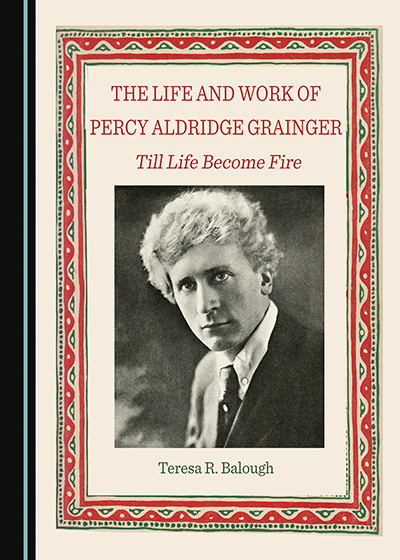- Apply
- Visit
- Request Info
- Give



Published on September 12, 2023
 Teresa Balough, lecturer of music history for almost 33 years at Eastern, recently published her book, “The Life and Work of Percy Aldridge Grainger: Till Life Become Fire.” As the title suggests, the book is the first attempt to compile details about Grainger, making new documents available to the public.
Teresa Balough, lecturer of music history for almost 33 years at Eastern, recently published her book, “The Life and Work of Percy Aldridge Grainger: Till Life Become Fire.” As the title suggests, the book is the first attempt to compile details about Grainger, making new documents available to the public.
Grainger was a composer and pianist from Australia, born in 1882. His work, some original and some inspired by folk music, was initially regarded highly by the public. He was also interested in the psychology of creativity, designing a building titled the Grainger Museum, where musical and artistic memorabilia could be studied and the music of the Pacific islands and Australia could be explored.
Though Grainger was well received in his youth, academics became critical of his ideas and views on music, especially his writings about pre-16th century, 20th century and Nordic music inspired by nature. He claimed these works had more artistic value than the much more popular music coming from Vienna in the 18th and 19th centuries. He also developed music machines that would create “free music” that went beyond typical melody, harmony and rhythm.
In the final 15 years of his life, before his death in 1961, he was seen as unserious and eccentric. Only in 1966 did he reemerge as a worthy composer and scholar.
Balough developed an interest in Grainger during her undergraduate studies at the University of Kentucky. “I had to ask permission to do my master’s thesis on Percy. He was not taken seriously,” Balough said.

Despite the academic criticisms that came with the study of Grainger, she persisted, developing a deep appreciation for the artist. She described him as “an early ethnomusicologist, though the term didn’t exist then.” Ethnomusicology is the study of music that explores the culture and people who create it.
Balough expressed a sense of gratitude at finishing her book. “It felt wonderful,” she said. “I’ve been working on this for almost 50 years now.”
There are many things that can be learned from Percy Grainger, Balough’s work reminds us. “He believed that music belongs to everyone, and that music should never compete or be compared,” she said. “He felt that all races, all peoples, are capable of creating beautiful music and it should be shared. And he believed music in tune with nature would bring world harmony.”
“The Life of Percy Aldridge Grainger: Till Life Become Fire” was published by Cambridge Scholars Publishing in June 2023. It is available on Amazon and the Cambridge Scholars Publishing website, where readers can get 25% off. There will also be a copy in the J. Eugene Smith Library.
Written by Marcus Grant